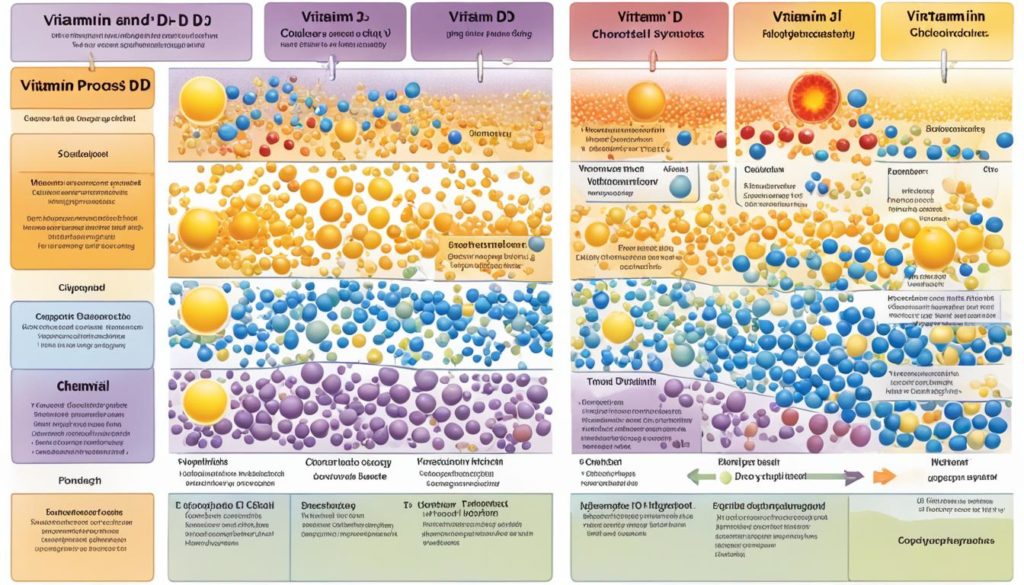Vitamin D is key for our health, going by the name Cholecalciferol. It keeps bones strong and helps our immune system. This vitamin is special because our bodies can make it, acting like a hormone. It plays a big part in using calcium, which makes our bones sturdy. Plus, it boosts our immune defenses. Research shows it might stop some cancers and heart disease (National Institutes of Health, American Journal of Clinical Nutrition, Harvard School of Public Health).
Key Takeaways
- Vitamin D, or Cholecalciferol, is crucial for bone density and immune system support.
- It functions as both a nutrient and a hormone in the body.
- Aids in calcium absorption, promoting stronger bones.
- Emerging research suggests its role in preventing certain cancers and heart disease.
- Understanding Vitamin D health benefits helps in maximizing its advantages in our daily lives.
What is Vitamin D?
Vitamin D is vital for our health, helping keep bones strong and supporting our metabolism. It acts like a prohormone, influencing our body in many ways. It helps manage calcium and phosphate in our body.

Definitions and Overview
Vitamin D’s importance is huge. It helps our body absorb calcium which is crucial for bone health and overall well-being. Our skin makes Vitamin D when it’s sunny, especially from UVB rays. But, many folks might need to eat certain foods or take supplements to get enough Vitamin D.
Types of Vitamin D
Vitamin D comes mainly in two types: D2 (ergocalciferol) and D3 (cholecalciferol). Between them, D3 is more effective at keeping our Vitamin D levels up. This fact matters for people’s health everywhere.
Some foods and diets can help us get these essential vitamins. The Journal of Clinical Endocrinology & Metabolism says D3 is particularly good at keeping Vitamin D at a good level. This makes it an essential nutrient for our health.
Importance of Vitamin D for Health
Vitamin D plays a key role in our overall well-being. It’s not just good for our bones, but it also helps our immune system and more. It’s vital for strong bones, a healthy immune system, and other important health aspects.

Role in Bone Health
Vitamin D is crucial for bone health. It helps manage the levels of calcium and phosphorus in our bodies. These minerals are key for making our bones strong. Without enough Vitamin D, we risk diseases like osteoporosis and weak bones over time.
Impact on Immune System
Research shows Vitamin D boosts our immune system. It changes how our immune cells work. A lack of it can make us more prone to getting sick and having immune system issues. Keeping Vitamin D levels up helps our body fight off illness and stay healthy.
Other Health Implications
Vitamin D also affects our mood and mental health. It may help prevent feelings of sadness or depression. It’s also connected to a lower chance of getting chronic diseases. This shows how vital Vitamin D is for feeling good all around.
| Health Aspect | Role of Vitamin D |
|---|---|
| Bone Health | Essential for bone mineralization and strength. |
| Immune System | Modulates immune responses, enhancing protection against infections. |
| Mental Health | Aids in mood regulation and potentially deters depression. |
| Chronic Disease Prevention | Linked to lower risk of developing chronic diseases. |
Vitamin D (Cholecalciferol) and its Functions in the Body
Vitamin D is also called cholecalciferol. It has many roles in keeping us healthy. One major role is helping our bodies get enough calcium.
Hormone Regulation
Cholecalciferol plays a big part in keeping our hormones balanced. After it’s changed in the liver and kidneys, it helps control genes. This helps with cell growth, muscle function, and fighting inflammation.
Calcium Absorption
Vitamin D benefits include improving calcium metabolism. It helps our guts absorb calcium better. This is key for healthy blood calcium levels. Having enough calcium supports our heart, muscles, and nerves.
Common Sources of Vitamin D
Vitamin D is key for good health and can come from the sun, certain foods, and fortified products. These sources help keep Vitamin D levels up, which is needed for many body functions.
Sunlight Exposure
Sunlight is a great natural source of Vitamin D. When your skin gets sunlight, it makes Vitamin D. But, where you live, your skin color, and the season can affect this.
People living near the equator get more sun. So, they usually have higher Vitamin D levels.
Dietary Sources
Food is also important for Vitamin D. Eating Vitamin D-rich foods helps. Fatty fish, egg yolks, and certain mushrooms are good for this.
These foods offer a good way to get Vitamin D. They help those who can’t get enough sun.
Fortified Foods
Some foods are made with added Vitamin D to help people meet their needs. This includes milk, orange juice, and cereals.
These fortified nutritional products help those on special diets. They make getting enough Vitamin D easier, which helps with health.
Symptoms of Vitamin D Deficiency
Vitamin D is key for being healthy. It’s important to catch a lack of it early to avoid big health problems. Here, we look at the early signs and how long-term lack of Vitamin D affects health.
Early Signs
Spotting Vitamin D deficiency early is hard because the signs are not always clear:
- Fatigue and general malaise
- Muscle weakness
- Bone pain
- Mood changes, like depression
It’s important to know these signs. This helps stop Vitamin D deficiency from getting worse.
Long-term Health Effects
Not dealing with Vitamin D deficiency can lead to serious problems:
- Rickets in kids: This means soft and weak bones
- Osteoporosis in adults: This leads to bones that break easily
- More chance of heart diseases
- A bigger risk of some cancers
- Possible autoimmune problems
To avoid these bad outcomes, preventing Vitamin D deficiency is key. Keeping Vitamin D levels okay helps keep you healthy for the long run.
Benefits of Vitamin D
Vitamin D is essential for our health. It helps make our bones strong and supports our immune system. It also aids in keeping our minds healthy.
Bone Strength and Density
Vitamin D is key for keeping bones strong. It helps avoid breaks and weak bones. For more info, check WebMD.
Immune Function Support
Vitamin D plays a big role in fighting infections. Having enough Vitamin D can help keep you healthy.
Mental Health Benefits
Good Vitamin D levels can fight depression. It’s vital for our mental well-being. For more, see research on Brain, Behavior, and Immunity.
Optimal Vitamin D Dosage
The right amount of Vitamin D depends on many things like age, weight, skin tone, how much sun you get, and your health. Groups like the Institute of Medicine and the Endocrine Society give advice to help people get enough Vitamin D. They also tell how to avoid taking too much.
It’s important to know the recommended amounts to take and the most you should take. The Institute of Medicine offers these numbers for different ages:
| Age Group | RDA (IU/day) | UL (IU/day) |
|---|---|---|
| 0-12 months | 400 IU | 1,000 IU |
| 1-18 years | 600-800 IU | 2,500-4,000 IU |
| 19-70 years | 600 IU | 4,000 IU |
| 71+ years | 800 IU | 4,000 IU |
| Pregnant & Lactating Women | 600 IU | 4,000 IU |
Talking to a healthcare provider can help decide how much Vitamin D you need. They consider your health and lifestyle when giving advice on Vitamin D.
Testing and Monitoring Vitamin D Levels
Keeping Vitamin D levels healthy is key for good health. It’s recommended to check your Vitamin D regularly through testing. The main test for Vitamin D involves a blood test for 25-hydroxyvitamin D. This test spots deficiencies and helps guide treatment like supplements or lifestyle changes.
Vitamin D affects many body functions, so it’s important to keep an eye on your levels. By testing often, you can make sure your body stays in top shape. This supports your bones, immune system, and overall health. For details on the test and why it matters, check out Vitamin D test.
Here’s a quick look at the important points about Vitamin D testing and monitoring:
| Aspect | Details |
|---|---|
| Test Name | 25-Hydroxyvitamin D blood test |
| Purpose | Diagnose Vitamin D deficiency and monitor treatment |
| Frequency | As recommended by healthcare provider, typically yearly |
| Health Impact | Supports bone health, immune function, and overall wellness |
In short, Vitamin D testing and monitoring are key for staying healthy. Making these a priority can lead to better health and a higher quality of life.
Vitamin D Supplements: When and How to Use Them
Sometimes, we don’t get enough sunlight or eat the right foods. That’s when Vitamin D supplements become important. Vitamin D3, or Cholecalciferol, is a good choice because our bodies use it well. Knowing when and how to take these supplements can help you stay healthy.
Types of Supplements
You can find Vitamin D supplements as capsules, liquid drops, or chewable tablets. Capsules are easy to store and use, making them a popular choice. Liquid drops let you adjust how much you take, which is great if you need a special dose. Chewable tablets are good for kids or anyone who finds pills hard to swallow. Choose the form that fits your needs and preferences best.
Choosing the Right Supplement
Finding the right Vitamin D supplement takes some thought. You need to consider the right dose, based on health recommendations and your doctor’s advice. Be mindful of any extra ingredients, especially if you have allergies. Also, think about how you’ll take the supplement. It should fit your lifestyle and ensure your body can absorb it well. With careful consideration, you can pick the best Vitamin D supplement for you.
FAQ
What are the health benefits of Vitamin D?
Vitamin D supports bone health and the immune system. It helps your body absorb calcium, keeping bones strong. It might even guard against some cancers and heart disease (“First source: National Institutes of Health”, “Second source: American Journal of Clinical Nutrition”, “Third source: Harvard School of Public Health”).
What is Vitamin D?
It’s a key vitamin for our bones and metabolism. There are two kinds: Vitamin D2 and D3. Vitamin D3 is better at boosting Vitamin D levels in the blood (“First source: National Library of Medicine”, “Second source: The Journal of Clinical Endocrinology & Metabolism”).
How does Vitamin D impact bone health?
It controls calcium and phosphorus in our body, crucial for strong bones. This prevents diseases like rickets in kids and osteoporosis in older people (“First source: Osteoporosis International”, “Second source: Journal of Investigative Medicine”).
What role does Vitamin D play in the immune system?
Vitamin D helps balance the immune system, lowering the risk of getting sick. Not having enough can increase the chance of infections and autoimmune diseases (“First source: Osteoporosis International”, “Second source: Journal of Investigative Medicine”).
How does Cholecalciferol function in the body?
As a pro-hormone, Cholecalciferol influences cell growth and fights inflammation. It’s crucial for heart health, muscle strength, and brain function (“First source: Endocrine Reviews”, “Second source: Molecular Biology of the Cell”).
What are the natural sources of Vitamin D?
Our skin makes Vitamin D from sunlight. You can also get it from fatty fish, egg yolks, and mushrooms. Plus, some foods like milk and cereal are added with Vitamin D (“First source: The Journal of Nutrition”, “Second source: American Journal of Public Health”).
What are the symptoms of Vitamin D deficiency?
Vitamin D deficiency might start as fatigue and aches. Over time, it can cause bigger problems: rickets in kids, osteoporosis in adults, and a higher risk of heart disease and some cancers (“First source: Mayo Clinic Proceedings”, “Second source: The Lancet Diabetes & Endocrinology”).
How does Vitamin D benefit mental health?
Studies show getting enough Vitamin D can help keep your mind healthy. It may even lower the risk of depression (“First source: Journal of Bone and Mineral Research”, “Second source: Brain, Behavior, and Immunity”).
What is the optimal dosage of Vitamin D?
How much Vitamin D you need depends on your age, weight, skin color, and sun exposure. Experts have made guidelines to make sure you get just right, without too much (“First source: Institute of Medicine”, “Second source: Endocrine Society”).
How are Vitamin D levels tested and monitored?
Doctors use a blood test to see your Vitamin D level. This test helps find out if you need more Vitamin D for good health (“First source: Clinical Chemistry”, “Second source: The Journal of Steroid Biochemistry and Molecular Biology”).
When and how should Vitamin D supplements be used?
You can take Vitamin D as capsules, liquid, or tablets. D3 is often suggested because it works better. Think about the dose, added ingredients, and how you take it for the best effect (“First source: Dietary Supplements”, “Second source: Pharmacy and Therapeutics”).


